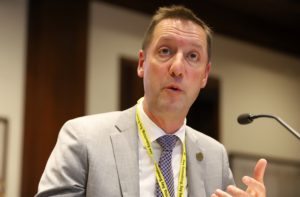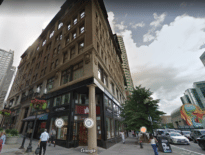Acknowledging in the wake of a tumultuous month that a series of safety improvements have been “not enough,” MBTA General Manager Steve Poftak said Tuesday that the agency’s long-term financial outlook remains strained and hinted that federal dollars may eliminate the need to rush through a solution.
Poftak told WBUR’s “Radio Boston” that the sizable pot of COVID-19 stimulus funding the T received during the pandemic will help cushion the agency for roughly another two years, into fiscal year 2024.
That could buy time for state legislators, who in recent months have shown virtually no interest in addressing the structural funding issues that plagued the MBTA well before the COVID-19 pandemic cut into ridership and who sometimes choose to tackle thorny issues only when a crisis erupts.
“We do have a need to solve some sort of shortfall in the operating budget, but we do have a couple of years to figure it out,” Poftak said. “On the capital side, we have sources for the capital budget identified for this year and the next few years. In the longer term, we are going to have to identify some new sources of capital funding.”
Both internal and external estimates indicate the MBTA’s financial woes will grow potent, with budget gaps of hundreds of millions of dollars per year, once it exhausts its roughly $2 billion in federal emergency aid.
One factor driving that strain is the muddy forecast for ridership.
Before the pandemic, fare revenue typically represented about a third of the operating dollars the MBTA brought in each year. Poftak said Tuesday that ridership has returned to about 60 percent of pre-COVID levels on buses, 45 percent on subway and 40 percent on the commuter rail network.
MBTA officials have been expecting that ridership will remain depleted for several years, and Poftak said they face an “open question” of how office reopenings will affect travel patterns.
“Will they come back five days a week or will they come back on some sort of hybrid schedule? My sense is it will be the latter,” he said.
A string of incidents on the MBTA in recent weeks, including an escalator malfunction at Back Bay station that injured several travelers and a Red Line derailment, generated new calls for state government to ramp up its investment in the beleaguered agency.
Poftak praised the T’s efforts in recent years to ramp up capital spending, which covers modernization, maintenance and expansions. Last year, he said, the MBTA spent $1.93 billion on those areas, about five times as much as it did a decade earlier.
But with an estimated $10 billion price tag to replace all outdated equipment and infrastructure across the MBTA, Poftak also cautioned that achieving more results will take time.
“We have decades of underinvestment that we are up against,” Poftak said. “One or two years of this extraordinary level is not going to suffice. We’re going to have to do it for a while.”
Gov. Charlie Baker, whose administration oversees the MBTA, has touted his efforts to accelerate capital spending at the T. In the wake of the recent string of incidents, Baker declared that “the MBTA is safe.”
Investigators have not determined the cause of the Sept. 28 Red Line derailment that damaged the platform at Broadway Station. A probe into the escalator malfunction is also ongoing, and while Poftak said it had been certified after an inspection on July 31, he said he could not speak in much more detail about the topic because of litigation.
A Green Line trolley crash this summer also highlighted the MBTA’s slow implementation of anti-collision technology that had been recommended as far back as 2008. Poftak said that feature should be ready by 2024, noting a “complicated process” behind the scenes to balance the safety features and the need to run trains frequently.
“The distance from the initial recommendation to implementation is longer than we would have liked,” Poftak said. “The Green Line, because you have two-car train sets, you have many more trains out on the system as opposed to the Red, Orange and Blue Lines, where you have fewer trains but they have more cars. So actually developing a system that works for the Green Line and fulfills that safety imperative has taken a lot of time.”
He defended the T for working to address safety issues, an area that an outside panel flagged as a concern when it concluded in December 2019 that financial belt-tightening, fear of retribution and a “deflated” feeling among leadership rendered safety not a priority.
“We have worked to build a stronger culture of safety,” Poftak told WBUR. “We review safety hotline issues every morning with our senior team, but it’s clear that it’s not enough. There’s still more work to be done. I think there’s no one at the MBTA who thinks we’re done. We need to do more work to make this system as safe as it possibly can be.”






